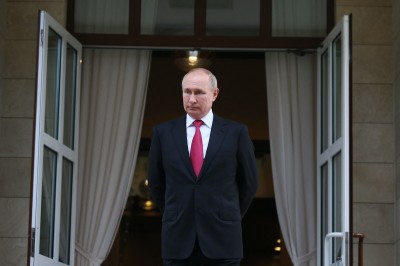What's next in Ukraine?

Vladimir Putin is in trouble. His unwarranted but massive invasion of Ukraine has been repudiated by all the world’s most repulsive governments and, more immediately, on the battlefield.
The recent defeat of Russian forces across a wide front has demonstrated the weakness of the Russian military and the ineptitude of its commanders.
Even Putin continues to boast about such weaponry as hypersonic missiles and Russia’s military held an international arms show in Moscow, the Russian army is in near-collapse. Military analyst George Barros reports that the “conventional ground army ground force that the Kremlin has spent the last two decades on creating … has been just largely degraded and in a large part destroyed in the past six months of war in Ukraine.”
According to officials at the Defense Department, up to 80,000 Russian service personnel have been killed or wounded since the invasion of Ukraine began. This is about 50% of the total number of Russian troops that have participated in the invasion.
Any military that loses half of its troop strength in a major operation can no longer have any claim to credibility. As CIA Director William Burns said earlier this month, “Not only has the weakness of the Russian military been exposed, but there’s going to be long-term damage done to the Russian economy and to generations of Russians as a result of this.”
In light of the humiliating rout of Russian forces, American policymakers and their allies are evaluating what Putin’s next steps might be. This is a matter of particular concern not only to Ukraine but to all NATO members, including the United States.
Vladimir Putin is nothing if not proud of Mother Russia. A major reason for his invasion of Ukraine was his desire to restore some of the what the defunct Soviet empire lost. His outrage at the botched invasion of a weaker power and what was, for Putin and his advisors, the apparently unanticipated military support Ukraine has received from the U.S. and our allies, has pushed Putin into a corner from which there is no clear path out.
So, what are his options? A mature leader would make an attempt at face-saving (“Russia let the world know we are a great power!”) and pull its army back into home territory. Yet a mature leader would never have invaded a peaceful neighbor and conducted brutal warfare against its people. And Putin shows no sign of what we in the West call “growing in office.”
Putin could “pull a Hitler,” blame his generals, and bring his soldiers home. Unlike the rantings of the Fuhrer, however, Putin would be partially correct. Neither Russian strategy nor tactics have been effective. The loss of as many as 4,000 armored vehicles means a severe depletion of Russia’s capacity to wage a successful war. That Russia’s top commanders so underestimated the resolve of Ukraine and the willingness of the NATO alliance to provide extensive and high-quality military aid to the Zelensky government indicates severe political miscalculation as well as defective military planning.
Yet Putin’s pride and what likely is irrational indignation probably will grip his better judgment. To admit defeat would be not only a concession of military weakness but also provide the West with yet another victory over Russia, this time in what is, in part, a test of NATO (and especially American) weaponry against Russian weaponry.
The most likely outcome is Russia’s doubling-down of its efforts to conquer Ukraine. The Ukrainian government reports that “after strikes on power plants plunged large areas of Ukraine into darkness” a few days ago, “Russia (has) stepped up the number of ships and submarines in the Black Sea carrying its Kalibr cruise missiles.” This means more attacks on Ukrainian infrastructure and, probably, civilian targets. Since the Russian invasion began in February, 5,600 Ukrainian civilians have been killed and about 8,000 injured. In Putin’s probable calculus, a few (or many) thousand more shouldn’t be allowed to stand in the way of total victory.
How the West will respond if the conflict escalates, especially if Putin resorts to battlefield nuclear weapons (even if relatively small, their devastation would be profound and their long-term impact immeasurable), is hard to know. Christians need to pray that God would, through whatever means He chooses, soon bring peace to the battered people of a violated nation.
Ultimately, Vladmir Putin will face an unimaginably greater power than anything Ukraine, NATO, or anyone else can create. The psalmist warns “the kings of the earth” that God “will speak to them in His wrath, and terrify them in his fury” (2:5). How particularly true this will be for those whose grasp on power is crusted with the blood of the innocent. Like the current president of Russia.
Originally published at The Washington Stand.
Rob Schwarzwalder is Senior Lecturer in Regent University’s Honors College. Before coming to Regent University, Schwarzwalder was senior vice president at the Family Research Council for more than seven years, and previously served as chief of staff to two members of Congress. He was also a communications and media aide to a U.S. senator and senior speechwriter for the Hon. Tommy Thompson, secretary of the U.S. Department of Health and Human Services. For several years, he was director of Communications at the National Association of Manufacturers. While on Capitol Hill, Schwarzwalder served on the staffs of members of both Senate and House Armed Services Committees and the Senate Committee with oversight of federal health care policy. His writing has been carried in such diverse publications as the New York Times, U.S. News, Time Magazine, Christianity Today, the Public Interest, and the Federalist.





















